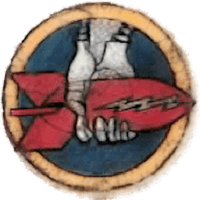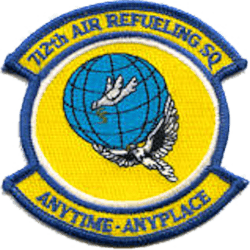712th Air Refueling Squadron
| 712th Air Refueling Squadron | |
|---|---|
|
Emblem of the 712th Air Refueling Squadron | |
| Active | 1943-1951; 1994-1996 |
| Country | United States |
| Branch | United States Air Force |
| Type | Air Refueling |

The 712th Air Refueling Squadron is an inactive United States Air Force unit. It was last assigned to the 19th Operations Group, stationed at Robins Air Force Base, Georgia. The unit was inactivated on 1 July 1996.
History
Activated in mid-1943 as a B-24 Liberator heavy bomb squadron, trained under Second Air Force. Deployed to England in the European Theater of Operations (ETO) during November 1943, assigned to VIII Bomber Command as a strategic bombardment squadron. Participated in the air offensive over Nazi Germany and Occupied Europe until German capitulation in May 1945. Personnel demobilized in England and returned to the United States; squadron reassigned to Second Air Force and re-equipped with B-29 Superfortresses, being trained for deployment to Pacific Theater. Japanese capitulation canceled deployment and was assigned to Fort Worth AAF, Texas as Continental Air Forces, later Strategic Air Command squadron. Budget and personnel shortages led to inactivation in August 1946.
Activated in the postwar reserve as a B-29 squadron. Trained for proficiency as part of Strategic Air Command reserve forces. Activated as a result of Korean War in 1951, squadron's aircraft and personnel reassigned to Far East Air Force Bomber Command, inactivated as a paper unit.
Reactivated in 1994 as a KC-135 Stratotanker refueling squadron. Inactivated in 1996 as part of realignment of host 19th Operations Group.
Lineage
- Constituted 712th Bombardment Squadron (Heavy) on 6 April 1943
- Activated on 1 May 1943
- Redesignated 712th Bombardment Squadron (Very Heavy) on 5 August 1945
- Inactivated on 4 August 1946
- Activated in the reserve on 19 April 1947
- Redesignated 712th Bombardment Squadron (Light) on 27 June 1949
- Ordered to active service on 17 March 1951
- Inactivated 21 March 1951
- Redesignated 712th Air Refueling Squadron, and activated, on 1 April 1994
- Inactivated on 1 July 1996.
Assignments
- 448th Bombardment Group, 1 May 1943 – 4 August 1946; 19 April 1947 – 21 March 1951
- 19th Operations Group, 1 April 1994 – 1 July 1996
Stations
|
|
Aircraft
- B-24 Liberator, 1943–1945
- B-29 Superfortress, 1945–1946
- KC-135 Stratotanker, 1994–1996
References
![]() This article incorporates public domain material from websites or documents of the Air Force Historical Research Agency.
This article incorporates public domain material from websites or documents of the Air Force Historical Research Agency.
- Maurer, Maurer, ed. (1982) [1969]. Combat Squadrons of the Air Force, World War II (PDF) (reprint ed.). Washington, DC: Office of Air Force History. ISBN 0-405-12194-6. LCCN 70605402. OCLC 72556.
